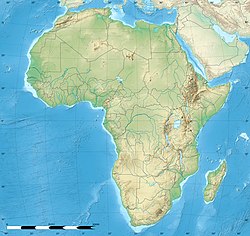Gaborone

Gaborone | |
|---|---|
City | |
 | |
| Nicknames: Gabs, GC, Gabz, G-City, Magheba, Moshate | |
| Coordinates: 24°39′29″S 25°54′44″E / 24.65806°S 25.91222°E | |
| District | Gaborone |
| Sub-district | Gaborone |
| Founded | 1964[1] |
| Named for | Kgosi Gaborone |
| Government | |
| • Type | City commission government |
| • Body | Gaborone City Council |
| • Mayor | Kagiso Thutlwe (Botswana National Front)[2] |
| • Deputy Mayor | Florence Shagwa (BCP)[2] |
| Area | |
| • City | 169 km2 (65 sq mi) |
| Elevation | 1,014 m (3,327 ft) |
| Population (2011)[5] | |
| • City | 231,626 |
| • Density | 1,400/km2 (3,500/sq mi) |
| • Metro | 421,907 |
| Time zone | UTC+2 (Central Africa Time) |
| • Summer (DST) | UTC+2 (not observed) |
| Geographical area code[6][7] | 3XX |
| ISO 3166 code | BW-SE |
| Climate | BSh |
| Website | Gaborone City Council Website |
Gaborone is the capital city of Botswana. It has a population of 231,626 people. Gaborone is one of the fastest-growing cities in Africa. Gaborone is on the Notwane River in the southeastern corner of Botswana. It is 15 km (9.3 mi) from the South African border.
The main campus of the University of Botswana is in the city. Gaborone's airport, Sir Seretse Khama International Airport, is Botswana's main international airport.
History
[change | change source]Before 1969, the city was known as Gaberones. Gaberones replaced Mafeking as the capital of the Bechuanaland Protectorate in 1965. Mafeking was outside the Bechuanaland Protectorate. It was in an area of South Africa. When the Protectorate became independent, Botswana needed a capital city that was inside the country. It had been thought that Lobatse would be the capital. It was later decided that they would create a new capital next to Gaberones, a small colonial administrative settlement.
The original name, Gaberones, is from Gaborone's Village. It was named after Chief Kgosi Gaborone of the BaTlokwa tribe. His village, now called Tlokweng, was just across a river from the "Government Camp" (colonial government headquarters). "Gabs" is still a common nickname for Gaborone. A newer nickname for Gaborone is G-City.
The centre of the city was constructed in three years. It includes Assembly buildings, government offices, a power station, a hospital, schools, a radio station, a telephone exchange, police stations, a post office, and more than 1,000 houses. Much of the city was in place for Independence Day on September 30 1966, when the county became independent of the United Kingdom. The first mayor of Gaborone was Rev J. D. Jones. The old Gaberones became a suburb of the new Gaborone, and is now known as "the Village".
References
[change | change source]- ↑ Parsons, Neil (19 August 1999). "Botswana History Page 7: Geography". Botswana History Pages. Gaborone, Botswana: University of Botswana History Department. Retrieved 4 August 2009.
- ↑ 2.0 2.1 Keoreng, Ephraim (5 October 2011). "New Gaborone Mayor seeks power to hire and fire". 28 (148). Gaborone, Botswana: Mmegi Online. Archived from the original on 17 June 2012. Retrieved 9 October 2011.
{{cite journal}}: Cite journal requires|journal=(help) - ↑ "BOTSWANA STATISTICAL YEAR BOOK 2010" (PDF). Statistics Botswana. Gaborone: Central Statistics Office. December 2011. Archived from the original (PDF) on 4 September 2015. Retrieved 25 February 2012.
- ↑ "Gaborone, Botswana Page". Falling Rain Genomics, Inc. Archived from the original on 4 September 2011.
- ↑ "The Population of Towns, Villages and Associated Localities" (PDF). 2011 Population and Housing Census. Gaborone: Statistics Botswana. June 2012. Archived from the original (PDF) on 14 June 2012. Retrieved 14 June 2012.
- ↑ "Current Local Time in Gaborone, Botswana". www.timeanddate.com. Archived from the original on 9 February 2014. Retrieved 28 April 2018.
- ↑ Botswana Telecommunications Authority (11 September 2009). Botswana (country code +267). International Telecommunication Union. Archived from the original (DOC) on 27 December 2009. Retrieved 27 December 2009.
{{cite book}}:|work=ignored (help)
Other websites
[change | change source]- Map of Gaborone Archived 2006-07-04 at the Wayback Machine

